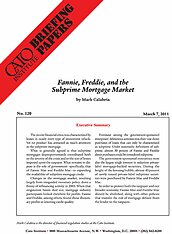The recent financial crisis was characterized by losses in nearly every type of investment vehicle. Yet no product has attracted as much attention as the subprime mortgage.
What is generally agreed is that subprime mortgages disproportionately contributed both to the severity of the crisis and to the size of losses imposed upon the taxpayer. What remains in dispute is the role of government — specifically, that of Fannie Mae and Freddie Mac — in expanding the availability of subprime mortgage credit.
Changes in the mortgage market, resulting largely from misguided monetary policy, drove a frenzy of refinancing activity in 2003. When that origination boom died out, mortgage industry participants looked elsewhere for profits. Fannie and Freddie, among others, found those illusionary profits in lowering credit quality.
Foremost among the government-sponsored enterprises’ deleterious activities was their vast direct purchases of loans that can only be characterized as subprime. Under reasonable definitions of subprime, almost 30 percent of Fannie and Freddie direct purchases could be considered subprime.
The government-sponsored enterprises were also the largest single investor in subprime privatelabel mortgage-backed securities. During the height of the housing bubble, almost 40 percent of newly issued private-label subprime securities were purchased by Fannie Mae and Freddie Mac.
In order to protect both the taxpayer and our broader economy, Fannie Mae and Freddie Mac should be abolished, along with other policies that transfer the risk of mortgage default from the lender to the taxpayer.

This work is licensed under a Creative Commons Attribution-NonCommercial-ShareAlike 4.0 International License.

